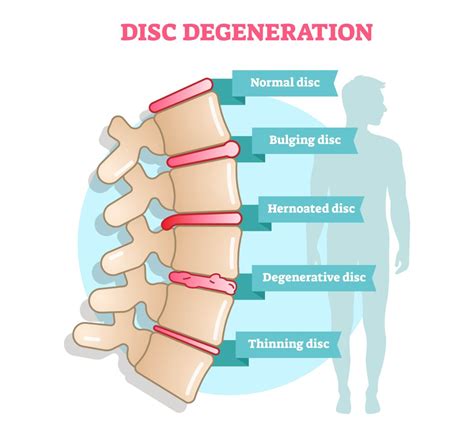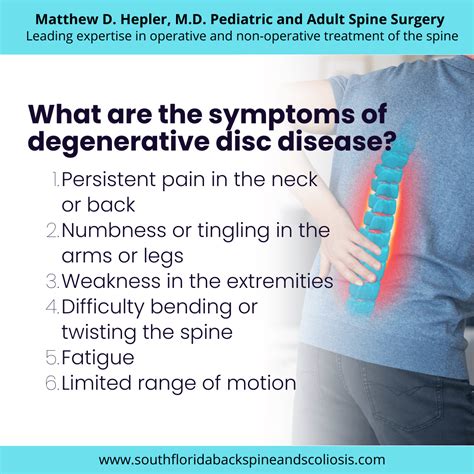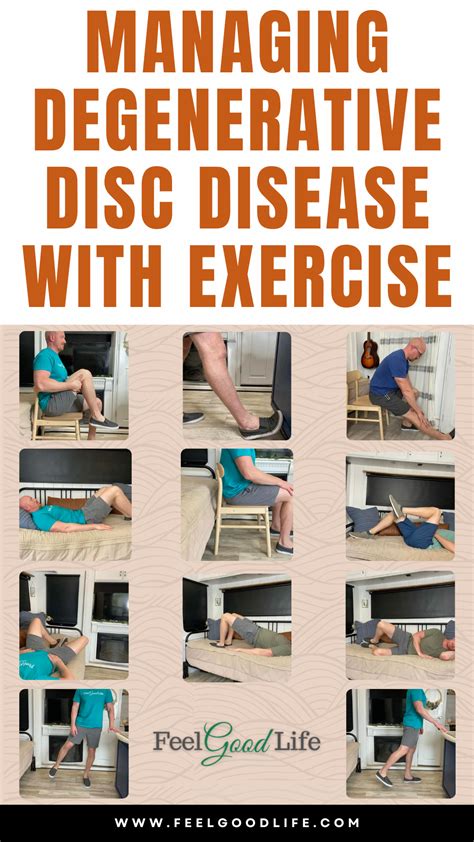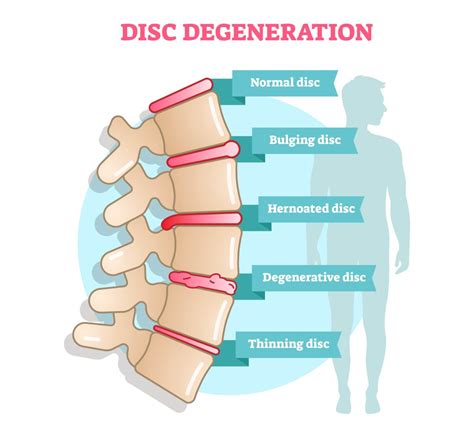Intro
Degenerative disk disease is a condition that affects the spinal disks, which are the soft, gel-like pads that separate the vertebrae in the spine. As we age, these disks can break down and lose their cushioning ability, leading to pain, stiffness, and limited mobility. Degenerative disk disease is a common condition that can affect anyone, but it is more common in people over the age of 50. In this article, we will explore 5 ways degenerative disk disease can affect the body and what can be done to manage the condition.
Degenerative disk disease can have a significant impact on a person's quality of life. The condition can cause chronic pain, numbness, and tingling in the back, neck, and extremities. It can also lead to limited mobility and flexibility, making it difficult to perform everyday activities. In severe cases, degenerative disk disease can cause bladder and bowel problems, as well as sexual dysfunction. It is essential to understand the causes and symptoms of degenerative disk disease to seek proper treatment and management.
The spine is a complex structure made up of vertebrae, disks, and nerves. The disks act as shock absorbers, allowing the spine to flex and twist. However, as we age, the disks can break down, leading to degenerative disk disease. The condition can be caused by a combination of factors, including genetics, lifestyle, and injuries. Maintaining a healthy weight, exercising regularly, and practicing good posture can help reduce the risk of developing degenerative disk disease. Early diagnosis and treatment can also help manage the condition and prevent further complications.
Understanding Degenerative Disk Disease

Degenerative disk disease is a condition that affects the spinal disks, causing them to break down and lose their cushioning ability. The condition can cause pain, stiffness, and limited mobility in the back, neck, and extremities. There are several types of degenerative disk disease, including cervical, thoracic, and lumbar disk disease. Each type affects a different region of the spine and can cause different symptoms. Understanding the causes and symptoms of degenerative disk disease is essential to seeking proper treatment and management.
Causes and Risk Factors
The causes of degenerative disk disease are not fully understood, but several factors can increase the risk of developing the condition. These include: * Genetics: People with a family history of degenerative disk disease are more likely to develop the condition. * Age: Degenerative disk disease is more common in people over the age of 50. * Lifestyle: Maintaining a healthy weight, exercising regularly, and practicing good posture can help reduce the risk of developing degenerative disk disease. * Injuries: Trauma to the spine, such as a herniated disk or spinal fracture, can increase the risk of developing degenerative disk disease.Symptoms of Degenerative Disk Disease

The symptoms of degenerative disk disease can vary depending on the location and severity of the condition. Common symptoms include:
- Back pain: Pain in the back, neck, or extremities is a common symptom of degenerative disk disease.
- Stiffness: Stiffness in the back, neck, or extremities can make it difficult to move or perform everyday activities.
- Limited mobility: Degenerative disk disease can cause limited mobility and flexibility, making it difficult to perform everyday activities.
- Numbness and tingling: Numbness and tingling in the back, neck, or extremities can be a symptom of degenerative disk disease.
Diagnosis and Treatment
Diagnosing degenerative disk disease typically involves a combination of physical examination, medical history, and imaging tests. Treatment for degenerative disk disease depends on the severity of the condition and can include: * Pain management: Medications, such as pain relievers and muscle relaxants, can help manage pain and discomfort. * Physical therapy: Physical therapy can help improve mobility and flexibility, as well as strengthen the muscles that support the spine. * Surgery: In severe cases, surgery may be necessary to relieve pressure on the spinal cord or nerves.Managing Degenerative Disk Disease

Managing degenerative disk disease requires a comprehensive approach that includes lifestyle modifications, pain management, and physical therapy. Maintaining a healthy weight, exercising regularly, and practicing good posture can help reduce the risk of developing degenerative disk disease. Early diagnosis and treatment can also help manage the condition and prevent further complications.
Lifestyle Modifications
Lifestyle modifications can help manage degenerative disk disease and reduce the risk of further complications. These include: * Maintaining a healthy weight: Excess weight can put additional stress on the spine, exacerbating degenerative disk disease. * Exercising regularly: Regular exercise can help improve mobility and flexibility, as well as strengthen the muscles that support the spine. * Practicing good posture: Good posture can help reduce stress on the spine and prevent further complications.5 Ways Degenerative Disk Disease Can Affect the Body

Degenerative disk disease can have a significant impact on the body, affecting not only the spine but also the overall quality of life. Here are 5 ways degenerative disk disease can affect the body:
- Chronic pain: Degenerative disk disease can cause chronic pain in the back, neck, and extremities, making it difficult to perform everyday activities.
- Limited mobility: The condition can cause limited mobility and flexibility, making it difficult to move or perform everyday activities.
- Numbness and tingling: Numbness and tingling in the back, neck, or extremities can be a symptom of degenerative disk disease.
- Bladder and bowel problems: In severe cases, degenerative disk disease can cause bladder and bowel problems, as well as sexual dysfunction.
- Mental health issues: Degenerative disk disease can also have a significant impact on mental health, leading to depression, anxiety, and stress.
Conclusion and Next Steps
Degenerative disk disease is a common condition that can have a significant impact on the body. Understanding the causes and symptoms of the condition is essential to seeking proper treatment and management. By maintaining a healthy weight, exercising regularly, and practicing good posture, individuals can reduce the risk of developing degenerative disk disease. Early diagnosis and treatment can also help manage the condition and prevent further complications. If you are experiencing symptoms of degenerative disk disease, it is essential to consult with a healthcare professional to determine the best course of treatment.What are the symptoms of degenerative disk disease?
+The symptoms of degenerative disk disease can include chronic pain, stiffness, limited mobility, numbness, and tingling in the back, neck, or extremities.
How is degenerative disk disease diagnosed?
+Diagnosing degenerative disk disease typically involves a combination of physical examination, medical history, and imaging tests, such as X-rays, CT scans, or MRI scans.
What are the treatment options for degenerative disk disease?
+Treatment for degenerative disk disease depends on the severity of the condition and can include pain management, physical therapy, and surgery.
Can degenerative disk disease be prevented?
+While degenerative disk disease cannot be completely prevented, maintaining a healthy weight, exercising regularly, and practicing good posture can help reduce the risk of developing the condition.
What are the complications of degenerative disk disease?
+Complications of degenerative disk disease can include chronic pain, limited mobility, numbness, and tingling, as well as bladder and bowel problems, and mental health issues.
We hope this article has provided you with a comprehensive understanding of degenerative disk disease and its effects on the body. If you have any further questions or concerns, please do not hesitate to comment below or share this article with others who may be affected by this condition. By working together, we can raise awareness and promote education about degenerative disk disease, helping individuals to manage their symptoms and improve their overall quality of life.
